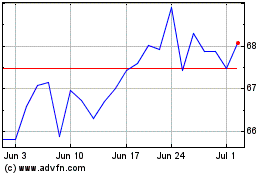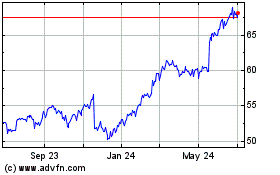By Serena Ng
Boxes of luxury perfumes from Dolce & Gabbana, Calvin Klein
and Davidoff line a store shelf inside a suburban mall near New
York City. The fragrances, which typically cost more than $50 each,
have prices up to one-third less than what shoppers see in
department stores like Kohl's or Macy's.
That's because the display is at a Wal-Mart Supercenter, where
the designer perfumes are inside a locked glass case--across the
aisle from $2 lipsticks and $4 eye makeup.
The Wal-Mart display is striking because the companies that make
these designer fragrances don't supply them to the world's largest
retailer. Instead, the perfumes come from the gray market, or what
product manufacturers consider unofficial or unauthorized sales
channels for their goods.
Big luxury perfume makers like Procter & Gamble Co. and Coty
Inc. try to limit their products to official channels but have
found it difficult to prevent unauthorized sales, according to
people close to the companies.
Some industry insiders and analysts, say, however, that pressure
to keep fragrance sales robust may have led manufacturers to turn a
blind eye to the flourishing gray market for their products.
In the U.S., perfume makers typically sell their products
directly to large retailers. In Europe and Asia, manufacturers
don't have direct distribution arrangements with many retailers,
including smaller perfumeries. As a result, brands often have to
sell through wholesalers and distributors.
The result can be price markdowns of up to 60% when perfume
makers sell their merchandise to overseas distributors, which could
make a quick profit by flipping the products back to U.S. mass
retailers that can buy in large volumes.
It isn't known how much luxury perfume is sold in the unofficial
channels, but there is enough supply of some bottles, such as Dolce
& Gabbana's Light Blue fragrance, that Wal-Mart features it in
advertisements. It can also be purchased at Target, drugstores and
online discounters.
A Wal-Mart Stores Inc. spokeswoman said the retailer works with
"well-respected suppliers" to provide its customers with a broad
assortment of fragrances. She declined to discuss sourcing of
specific brands. A Target Corp. spokesman said all its fragrances
are authentic and legally purchased and sold.
Designer perfumes have traditionally been the domain of
department stores and specialty retailers, part of a strategy by
luxury brands to cultivate an aura of exclusivity and status among
consumers. Premium-priced fragrances make up the bulk of the $5.9
billion U.S. fragrance category, which grew 2% last year, according
to Euromonitor International.
Consumer-goods giant P&G, which produces Dolce & Gabbana
fragrances under a licensing agreement with the Italian fashion
house, sells the perfume to high-end retailers like Bloomingdales,
Nordstrom and Sephora. But P&G doesn't sell it to Wal-Mart or
Target. The same goes for Coty, whose fragrance brands include
Calvin Klein and Davidoff.
Some mass retailers have obtained designer perfume brands from
distributors that weren't authorized to sell to them, industry
insiders say. The practice could reduce the cache of some luxury
brands and shoppers' willingness to pay a premium for their
perfumes. "If you see the fragrance you love sold at Macy's and
bulk-packed in a club store, it may diminish your feeling of the
prestige of the brand," says Ann Gottlieb, a New York-based
fragrance-industry consultant.
Fragrance sales have been sluggish in recent years, as Americans
have soured on celebrity perfumes and cut back purchases of
nonessential items since the 2008-2009 recession. Department-store
traffic has also fallen as people increasingly shop online.
P&G, which has had a luxury fragrance business for more than
a decade, earlier this summer said it would divest Dolce &
Gabbana, Hugo Boss, Gucci and other perfume brands by merging them
with Coty as part of a $13 billion deal that also includes makeup
brand CoverGirl and Wella hair-care products.
The transaction will double Coty's size and annual revenue base
to more than $10 billion, and make the combined company the world's
biggest seller of fragrances, with $4.5 billion in sales from this
area alone.
Both P&G and Coty have long struggled with their designer
perfumes being diverted to unauthorized retailers. In 2009, Zino
Davidoff SA, which owns the trademark for the Davidoff Cool Water
fragrances, obtained a preliminary injunction against CVS Corp.
after suing the drugstore chain for allegedly selling counterfeit
and gray-market versions of its perfume in packaging that had been
modified. CVS subsequently agreed not to sell Davidoff fragrances
that were fake or in packaging that had been tampered with.
Today, CVS sells several variations of Cool Water and other
luxury perfume brands on its website. "All fragrance products that
we offer for sale are purchased--and are being sold--lawfully under
all applicable laws," a CVS spokeswoman said. "These are genuine
products in good and salable condition."
Brian Brokate, head of the intellectual property practice group
at law firm Gibney, Anthony & Flaherty LLP, says it generally
isn't illegal for retailers to sell gray-market merchandise if the
products are authentic and approved for sale in the country. Mr.
Brokate wasn't involved in the CVS case.
P&G has tried to plug leaks in its perfume distribution by
cutting off firms that ignore or flout their selling agreements,
according to people close to the company. But unauthorized sellers
continue to pop up.
Elizabeth Arden Inc., which produces fragrances under its
namesake brand and various celebrities and designers, has spent the
past 20 months trying to tighten global distribution by cutting off
wholesalers and distributors that have sold its products to
unauthorized retailers.
Its fragrance sales plunged last year as a result, the company
said, but in recent quarters some brands have started to grow
again. Company executives hope the moves will have long-term
benefits and limit discounting of the products. "A big part of the
tightening of distribution is elevating the prestige element of the
brands," Elizabeth Arden's chief executive, Scott Beattie, told
investors last month.
Sarah Nassauer contributed to this article.
Write to Serena Ng at serena.ng@wsj.com
Subscribe to WSJ: http://online.wsj.com?mod=djnwires
(END) Dow Jones Newswires
September 25, 2015 20:23 ET (00:23 GMT)
Copyright (c) 2015 Dow Jones & Company, Inc.
Walmart (NYSE:WMT)
Historical Stock Chart
From Mar 2024 to Apr 2024

Walmart (NYSE:WMT)
Historical Stock Chart
From Apr 2023 to Apr 2024
